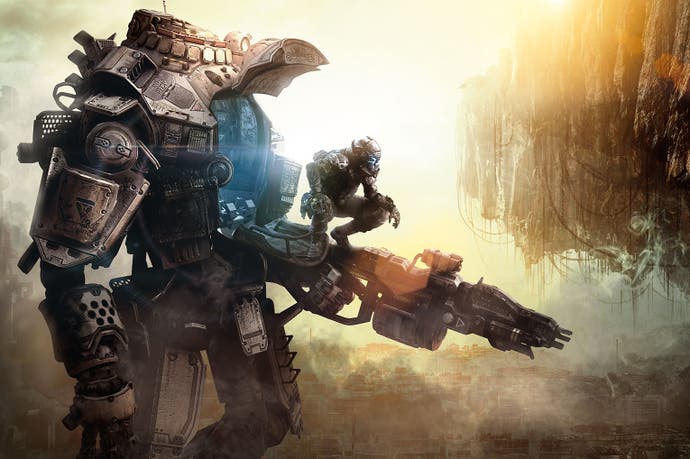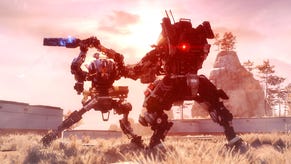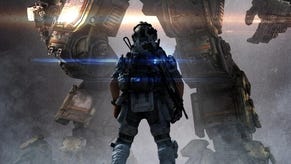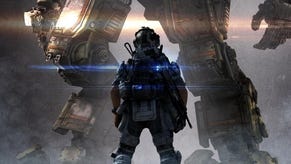Titanfall: the creators of Call of Duty reload the FPS
Bait and switch.
There's an interesting bait and switch in Titanfall, the first-person shooter from the people who made Call of Duty what it is today.
It begins with a rodeo, as the 70 developers at Respawn Entertainment call it. A Pilot, the game's agile, double-jumping, jet-pack boosting soldier class, leaps, perhaps from a rooftop, onto the back of a Titan, the game's lumbering but powerful mech class, rips off a panel and shoots its brains out - just a bit.
Inside of the Titan, the heads up display flashes a warning: "foreign body detected." The player panics, anticipating imminent destruction, and ejects.
Outside of the Titan the Pilot has already stopped shooting and is waiting patiently for the victim to emerge from their protective shell. When it does the Pilot fires and the switch is complete.
This scenario, described to me by Respawn lead artist Joel Emslie, who followed Vince Zampella and Jason West out of Infinity Ward having worked on Call of Duty from its second incarnation, reveals a subtlety to Titanfall that its ear-shredding debut at the end of Microsoft's E3 press conference betrayed.
What that demo did show us - fast-paced shooting, explosive action, silky smooth 60fps visuals, experience points and responsive controls - are exactly what I expected from the studio founded by the people who made Call of Duty the biggest game on earth. I'm more interested in what the demo didn't show us, or, at least, what wasn't obvious at first glance. This Pilot on Titan bait and switch is just one example of Titanfall's nuance.
"There's all kinds of layers of crazy," Emslie enthuses. "I come from a real hardcore FPS background. I'm very tactical. I like to chat with my buddies. I like to run parties with my friends who I trust.
"Now we're getting to Titan tactics, where you've got a fire line of Titans in the game and you're ducking behind a building. That's the stuff that gets my juice going. It's really cool."
"We will do whatever it takes to run at 60fps. It is the ultimate goal of everything we do, to have that fluid gameplay, that low latency as little as it can possibly be. Hopefully zero."
Respawn lead artist Joel Emslie
You've probably heard all about how Titanfall is a multiplayer-only game with elements of single-player thrown in. Respawn calls this "campaign multiplayer", a phrase used to describe how players encounter moments usually found in single-player portions of shooters as they're blasting each other to smithereens.
Central to this concept is AI. Each map is packed with AI controlled characters that do more than just shout when they see you and shoot you when your back is turned. Respawn says it's making use of Microsoft's 300,000 server cloud to help compute AI and physics (a somewhat woolly statement we had a chat with a number of developers about last week), and how dedicated servers mean matchmaking is a breeze - irrespective of your NAT settings.
But Emslie mentions ambient AI when we quiz him further. As players are knocking lumps out of each other, the AI will get on with its own business across the map. You might stumble upon a group of AI huddled in a room, for example, before blasting them to bits. AI soliders will make an assault on an enemy position and demand your attention. As Emslie describes how Titanfall's AI works, I think of them as creeps; the more I learn about Titanfall's fast and frenetic team versus team plus AI gameplay, the more I think of League of Legends and DOTA.
"Those ambient AI plays into selling the idea you're in a living, breathing world," Emslie says. "I don't know if it's never been done before, but we're trying to do that really well. We're trying to make that multiplayer environment feel great."
Titanfall's initially confusing fusion of single-player and multiplayer rekindles memories of PlatinumGames' Vanquish and, going back further, the best of the Star Wars: Battlefront series. But I can't deny Respawn its claim of innovation. You get a story cutscene as your dropship approaches the battlefield, and, during a match, "heroes", as Emslie describes them, pop up in windows in the upper corner of the HUD to bark orders and set objectives - an attempt to give the competitive carnage some fantastical meaning. You can follow this story through an entire campaign and play it from both sides.
Outside of campaign multiplayer and inside what would traditionally be viewed as competitive multiplayer, Respawn strips away the story and single-player elements for "full on sport multiplayer". It's in this mode that I see Titanfall gaining the most traction, and I suspect both Respawn and publisher EA are hoping the eSports community embraces the game. Given the overwhelming popularity of the MOBA genre in the eSports space, an FPS that borrows lightly from that genre has a great chance of gaining a foothold with professional players.
There's still much to be revealed. We're not sure of the scope of the battles, and this is a crucial component. Right now it's six on six, plus the AI, which Emslie says makes for a very tight experience despite the large maps. The developer will continue to tweak this as it tests the game, but he sounds happy enough as it stands. "The AI definitely fills the void," he says. "You're never sitting around waiting for something to happen. There's always something to do." Presumably the next PR beat will thump at Gamescom in August, and Emslie teases there are more modes to reveal in addition to campaign multiplayer and sports.
"We didn't have enough manpower and time to start completely from scratch, so we picked the best thing that worked best for us. We're really happy with it."
Joel Emslie on the decision to use Valve's Source engine for Titanfall
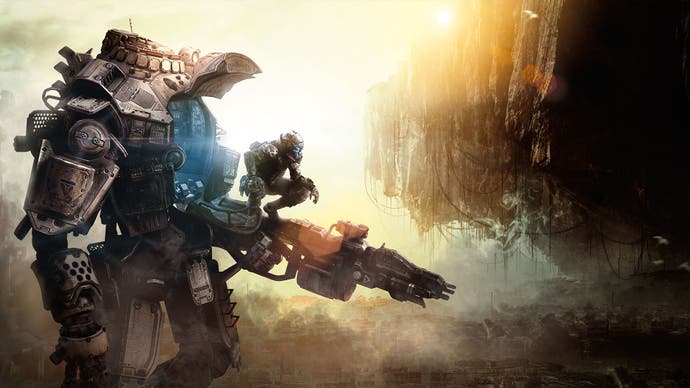
If there's a gaming god tinkering with the fate of the industry, he or she's having a right laugh with this one: Titanfall, from the creators of Call of Duty and the publishers of Battlefield, looks set to go up against Destiny, from the creators of Halo and the publishers of Call of Duty, in 2014. It's a next generation shooter face-off of epic proportions.
Titanfall has been compared with Halo and it's easy to see why. Soldiers and huge mechs battle with and against each other in vast, science-fiction-themed maps, and all the while there's AI gnawing at your ankle. It's as if someone took a typical 30 seconds of fun moment from any Halo campaign, with its Spartan and UNSC AI versus Covenant versus, sometimes, Flood action, and made it competitive.
A better comparison is with Destiny. Both offer connected multiplayer experiences and both are sci-fi shooters. For me Destiny is the more eye-catching of the pair. Its fantastical, dreamy environments whet the appetite in a way Titanfall's somewhat bland, war-torn battlefield does not, and Bungie's new matchmaking sounds genuinely ground-breaking, whereas I remain skeptical of Titanfall's use of the cloud, but there's more than meets the eye with EA's Halo killer, and more than a few fresh ideas buried underneath its bombastic debut. You just have to look for them.
